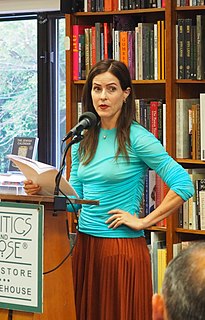A Quote by Bethany McLean
Building a portfolio around index funds isn’t really settling for the average. It’s just refusing to believe in magic.
Related Quotes
... skepticism about past returns is crucial. The truth is, much as you may wish you could know which funds will be hot, you can't - and neither can the legions of advisers and publications that claim they can. That's why building a portfolio around index funds isn't really settling for average. It's just refusing to believe in magic.
Nothing highlights better the continuing gap between rhetoric and substance in British financial services than the failure of providers here to emulate Jack Bogle's index fund success in the United States. Every professional in the City knows that index funds should be core building blocks in any long-term investor's portfolio. Since 1976, the Vanguard index funds has produced a compound annual return of 12 percent, better than three-quarters of its peer group.
Still, I figure we shouldn't' discourage fans of actively managed funds. With all their buying and selling, active investors ensure the market is reasonably efficient. That makes it possible for the rest of us to do the sensible thing, which is to index. Want to join me in this parasitic behavior? To build a well-diversified portfolio, you might stash 70 percent of your stock portfolio into a Wilshire 5000-index fund and the remaining 30 percent in an international-index fund.
Even fans of actively managed funds often concede that most other investors would be better off in index funds. But buoyed by abundant self-confidence, these folks aren't about to give up on actively managed funds themselves. A tad delusional? I think so. Picking the best-performing funds is 'like trying to predict the dice before you roll them down the craps table,' says an investment adviser in Boca Raton, FL. 'I can't do it. The public can't do it.'
There are 3 kinds of magic in our world. The peddling little magician magic like Uncle Andrew in 'The Magicians Newphew' where people mess around with things they don't understand. It's movie magic. Then there is the magic of the evil side of things. The demonic forces. And that's not really magic... it's corruption of what really exists. And then finally there is the magic of the Holy Spirit of God which is the creation and maintenence of the universe. We don't understand it... and we haven't the faintest idea how He does it. But it's real. That's the deep magic.
Index funds have regularly produced rates of return exceeding those of active managers by close to 2 percentage points. Active management as a whole cannot achieve gross returns exceeding the market as a while and therefore they must, on average, underperform the indexes by the amount of these expense and transaction costs disadvantages.
There is some confusion as to what magic actually is. I think this can be cleared up if you just look at the very earliest descriptions of magic. Magic in its earliest form is often referred to as “the art”. I believe this is completely literal. I believe that magic is art and that art, whether it be writing, music, sculpture, or any other form is literally magic.
One's attitude toward life makes every possible difference in one's living. You know, you don't have to study a thousand ancient books to discover that fact. But sometimes it needs to be pointed out again that life doesn't change so much as you. ... The day when you stop building your own environment, when you stop building your own surroundings, when you stop waving a magic hand and gracing everything around you with magic and beauty, things cease to be magical, things cease to be beautiful. Well, maybe you've just neglected somewhere back in the last few years to wave that magic hand.
Throughout the universe of public and private funds, managers are measured quarterly against one index or another, defined by statistics, and corralled into this category or that category so that fund of funds, pensions, and other institutions can make comforting - if not necessarily prudent - asset allocation decisions.

































